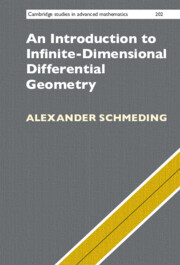Book contents
- Frontmatter
- Contents
- Preface
- 1 Calculus in Locally Convex Spaces
- 2 Spaces and Manifolds of Smooth Maps
- 3 Lifting Geometry to Mapping Spaces I: Lie Groups
- 4 Lifting Geometry to Mapping Spaces II: (Weak) Riemannian Metrics
- 5 Weak Riemannian Metrics with Applications in Shape Analysis
- 6 Connecting Finite-Dimensional, Infinite-Dimensional and Higher Geometry
- 7 Euler–Arnold Theory: PDEs via Geometry
- 8 The Geometry of Rough Paths
- Appendix A A Primer on Topological Vector Spaces and Locally Convex Spaces
- Appendix B Basic Ideas from Topology
- Appendix C Canonical Manifold of Mappings
- Appendix D Vector Fields and Their Lie Bracket
- Appendix E Differential Forms on Infinite-Dimensional Manifolds
- Appendix F Solutions to Selected Exercises
- References
- Index
5 - Weak Riemannian Metrics with Applications in Shape Analysis
Published online by Cambridge University Press: 08 December 2022
- Frontmatter
- Contents
- Preface
- 1 Calculus in Locally Convex Spaces
- 2 Spaces and Manifolds of Smooth Maps
- 3 Lifting Geometry to Mapping Spaces I: Lie Groups
- 4 Lifting Geometry to Mapping Spaces II: (Weak) Riemannian Metrics
- 5 Weak Riemannian Metrics with Applications in Shape Analysis
- 6 Connecting Finite-Dimensional, Infinite-Dimensional and Higher Geometry
- 7 Euler–Arnold Theory: PDEs via Geometry
- 8 The Geometry of Rough Paths
- Appendix A A Primer on Topological Vector Spaces and Locally Convex Spaces
- Appendix B Basic Ideas from Topology
- Appendix C Canonical Manifold of Mappings
- Appendix D Vector Fields and Their Lie Bracket
- Appendix E Differential Forms on Infinite-Dimensional Manifolds
- Appendix F Solutions to Selected Exercises
- References
- Index
Summary
In this chapter, we study in detail the (weak) L^2-metric on spaces of smooth mappings. Its importance stems from the fact that this metric and its siblings, the Sobolev H^s -metrics are prevalent in shape analysis. It will be essential for us that geodesics with respect to the L^2-metric can explicitely be computed. Let us clarify what we mean here by shape and shape analysis. Shape analysis seeks to classify, compare and analyse shapes. In recent years there has been an explosion of applications of shape analysis to diverse areas such as computer vision, medical imaging, registration of radar images and many more. Another typical feature in (geometric) shape analysis is that one wants to remove superfluous information from the data. For example, in the comparison of shapes, rotations, translations, scalings and reflections are typically disregarded as being inessential differences. Conveniently, these inessential differences can mostly be described by actions of suitable Lie groups (such as the rotation and the diffeomorphism groups).
Information
- Type
- Chapter
- Information
- An Introduction to Infinite-Dimensional Differential Geometry , pp. 106 - 119Publisher: Cambridge University PressPrint publication year: 2022
- Creative Commons
- This content is Open Access and distributed under the terms of the Creative Commons Attribution licence CC-BY-NC-ND 4.0 https://creativecommons.org/cclicenses/
